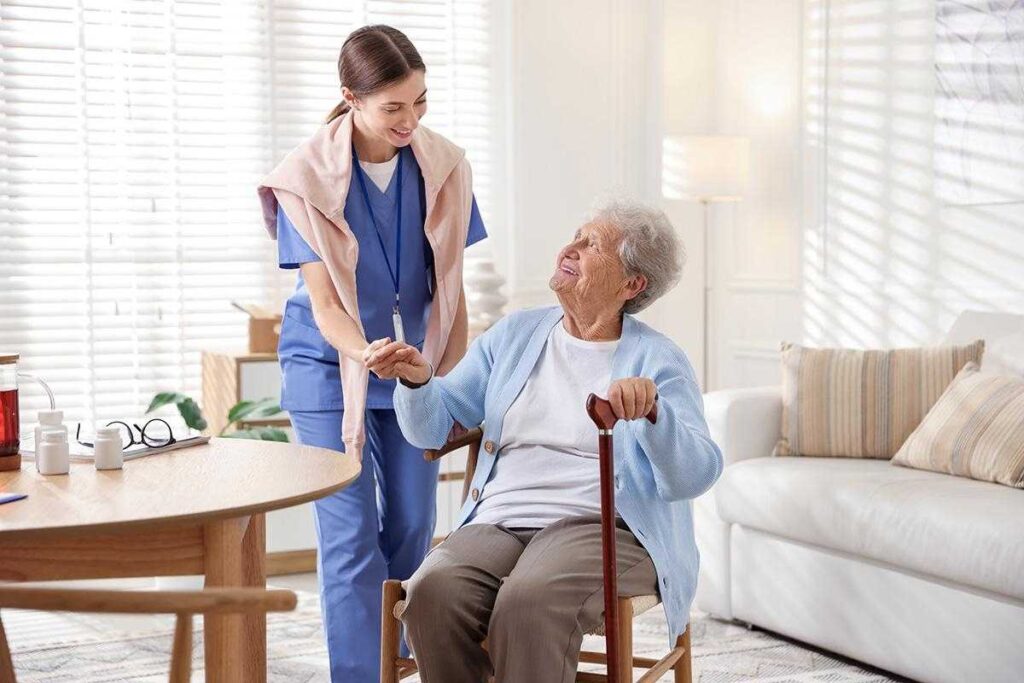Watching a parent age can be emotionally draining. One moment, they’re the pillars of strength you’ve always relied on, and the next, you’re witnessing their increasing vulnerability.

Among the many concerns that surface during this transition, elderly falling accidents and injuries rank among the most serious threats to your parents’ health, independence, and quality of life.
What does it mean when an elderly person keeps falling? That their health is at risk. The Timberley caregiving team empathizes with this situation and encourages you to take proactive measures that can help. While the immediate injuries of these accidents can be obvious, others are subtle, snowballing into health complications.
The Hidden Dangers of Senior Falls
Falls aren’t just accidents; they represent a significant health crisis for older adults. Each year, one in four Americans aged 65+ experiences a fall, often with devastating consequences. For your aging parent, a single fall can trigger a cascade of health complications, from fractures and head injuries to a permanent loss of independence.
What makes this reality particularly heartbreaking is that many falls are preventable with proper awareness and intervention. As an adult child, understanding fall prevention for seniors isn’t just about safety; it’s about preserving your loved one’s dignity and autonomy.
Warning Signs Your Parent May Be at Risk
Recognizing fall risk factors early can make all the difference in keeping your loved one safe:
- Difficulty rising from chairs.
- Holding onto furniture while walking.
- Avoiding stairs or certain rooms.
- Recent medication changes.
- Noticeable balance issues.
- Hesitation when walking.
- Unexplained bruises.
If you’ve noticed your mom with dementia keeps falling, this requires special attention as cognitive impairment significantly increases fall risk. Dementia affects spatial awareness, judgment, and perception — all critical factors in maintaining balance and safe movement. And remember, your mom or dad might have fallen without anyone seeing it happen; those unexplained bruises might be telling the story.
How to Prevent Falls: Home Modifications That Save Lives
Your parent’s home environment plays a central role in preventing falls. Consider these practical modifications:
- Remove tripping hazards: Clear clutter, secure rugs, and organize electrical cords.
- Improve lighting: Install brighter bulbs and night lights in hallways, stairs, and bathrooms.
- Install grab bars: Place these near toilets, showers, and tubs where falls commonly occur.
- Add handrails: Ensure stairs have secure handrails on both sides.
- Rearrange furniture: Create clear pathways throughout the home.
These modifications don’t need to turn your parent’s home into an institutional setting. With thoughtful design, those features can blend into their décor and provide the necessary protection.
Another proactive strategy focuses on improving their strength and flexibility: senior-friendly exercises.
Fall Prevention Exercises That Strengthen and Protect
Physical activity is one of the most effective strategies for preventing falls. These exercises maintain strength, balance, flexibility, and coordination:
- Tai Chi: This gentle practice improves balance and body awareness.
- Seated Leg Lifts: Strengthens the muscles needed for standing and walking.
- Standing Heel-to-Toe Walks: Enhances balance and coordination.
- Gentle yoga: Increases flexibility and core strength.
Even 10-15 minutes of daily movement may dramatically reduce fall risk. Encourage your parent to start slowly and build gradually. Consider joining them occasionally; not only will this provide supervision, but it creates meaningful connection time.
As you just read, fall prevention exercises can certainly help. But despite best efforts, injuries may still occur, especially if they live alone. What might you do when that happens?
When Falls Happen: Responding Effectively
First, stay calm and assess the situation before helping them move. Look for signs of injury like extreme pain, inability to move a limb, or visible wounds. If no serious injury is apparent, help them roll onto their side, then to a crawling position near a sturdy piece of furniture.
Call emergency services immediately if you suspect a fracture, head injury, or if they cannot get up.
Consider investing in a medical alert system so your parent can summon help when alone. These devices have evolved significantly—many now include automatic fall detection and GPS tracking.
Creating a Fall Prevention Plan, Together
Approach this as a collaborative effort with your parent, including them in decisions about home modifications and safety measures. Listen to their concerns, respecting their need for independence while addressing genuine safety risks. Remember that reducing fall risk isn’t about limiting their freedom; it’s about preserving it. With proper precautions, your parent can maintain their independence longer and continue enjoying meaningful activities.
Specialized Care for Peace of Mind
When an elderly parent keeps falling and home-based care becomes increasingly challenging, communities like The Timberley in Acworth, GA offer assisted living environments designed with senior fall prevention in mind. Our community has living spaces specifically engineered to minimize the risks while maximizing independence. From thoughtfully designed apartment floor plans to strategic lighting and supportive features, every detail serves aesthetic and practical purposes.
Beyond the physical environment, our highly trained, compassionate team members understand the complex factors contributing to falls and implement personalized prevention strategies for each resident. Residents get the support they need, and their loved ones enjoy peace of mind.
Your Next Steps for Your Parent’s Well-Being
Protecting your aging parent from injuries requires attention, planning, and sometimes, difficult conversations. Start by assessing their current living environment and health status. Discuss your observations openly, focusing on how safety measures can extend their independence rather than restrict it.
Knowing what to do when a parent keeps falling and staying involved makes a profound difference. By taking proactive steps toward fall prevention for seniors, you’re not just guarding your parent’s physical health; you’re honoring the care they once provided you.
We Cherish and Protect Our Residents
The Timberley caregiving team offers expert guidance, supportive care, and an environment where your parent can thrive amongst their peers. Schedule a tour and see how our thoughtful approach to senior living creates a welcoming, protected environment. Your parent deserves a community that values their well-being as much as you do.
